Recent Newsletters
- Summer 2025 Newsletter
- Spring 2025 Newsletter
- Fall 2024 Newsletter
- Summer 2024 Newsletter
- Spring 2024 Newsletter
- Fall 2023 Newsletter
- Summer 2023 Newsletter
- Spring 2023 Newsletter
- Fall 2022 Newsletter
- Summer 2022 Newsletter
- Spring 2022 Newsletter
- Fall 2021 Newsletter
- Summer 2021 Newsletter
- Summer 2021 Newsletter
- Fall 2020 Newsletter
- Summer 2020 Newsletter
- Spring 2020 Newsletter
- Fall 2019 Newsletter
- Summer 2019 Newsletter
- Spring 2019 Newsletter
- Summer 2018 newsletter
- Winter 2018 newsletter
Community Events and Programs
Each spring we host our annual Community Aphasia Event (ACE) to bring our community together. This event is open to participants with aphasia, care partners, local rehab professionals, and anyone in the community who is interested in learning more about aphasia. At the event, we have invited speakers, resource tables, research updates, food, and time to connect with each other.
Our past ACE events have included:
2017- Tom Broussard (author of “Stroke Diary” and person with aphasia)
2018- Audrey Holland (SLP, aphasia researcher)
2019- Carl McIntyre (producer and person with aphasia)
2021- Debra Meyerson (author of “Identity Theft” and person with aphasia) & Steve Zuckerman (care partner)
2022- Argye Hillis (neurologist and SLP) Theme: “Living Well with Aphasia”
2023- Simon Barton (author of “Bad Rhymes, No Reason” and stroke survivor); Theme: “Growing Together”
2024- Jeffrey Fisher (author of “Never Give Up” and person with aphasia), Dr. Elizabeth Regan (PT and researcher); Theme: “Light up your Life!”
View the 2024 Virtual Aphasia Community Event Video
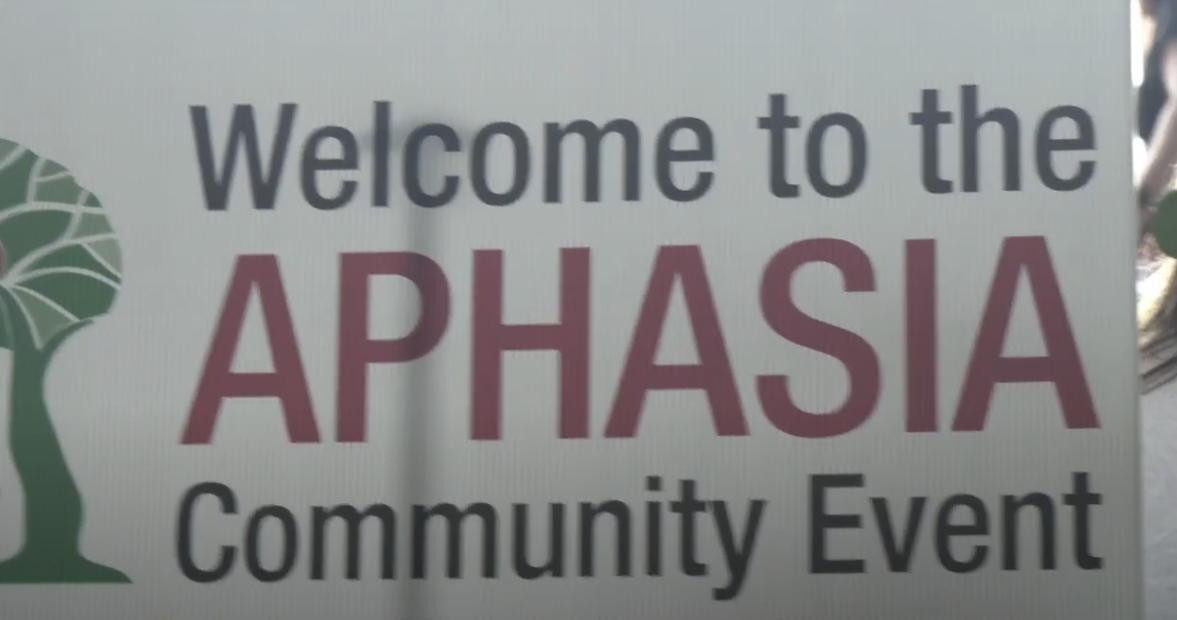
View the Aphasia Ambassadors Video
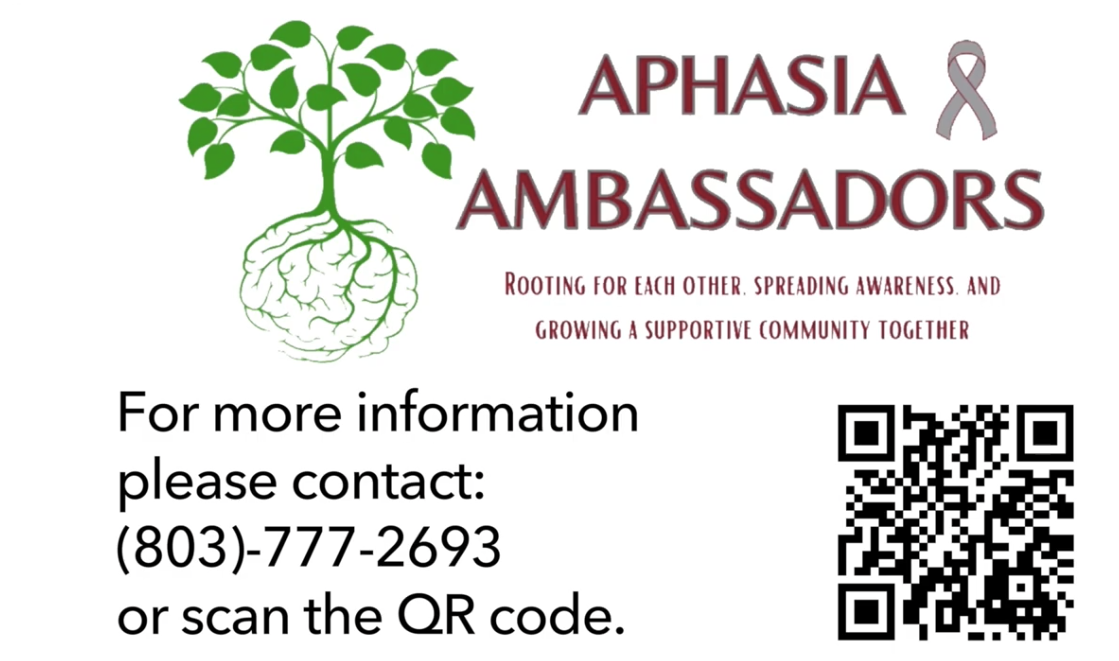
The Aphasia Ambassadors Program here at the University of South Carolina’s Center for the Study of Aphasia Recovery is a supportive community dedicated to assisting individuals through their stroke recovery journey. Our ambassadors have experienced aphasia themselves and understand the isolating challenges that often accompany stroke rehabilitation.
In our program, we provide tools and resources to our ambassadors so they can offer guidance, support and hope to fellow stroke survivors. Our mission is simple yet profound — to empower others, promote hope and increase quality of life.
If you are interested in connecting with our ambassadors, becoming an ambassador, or setting up a speaking engagement, please complete our interest survey: https://redcap.link/USCAphasiaAmbassadors.
In the Aphasia Ambassadors Program, we believe that no one should face stroke recovery alone.
Phone: (803) 777-2693
Email: ssayers@mailbox.sc.edu
Post-Stroke Aphasia and Employment
Post-stroke aphasia is a language disorder caused by damage to brain regions underlying speech and language functions. Aphasia is a common disorder that can greatly impact a person’s communication skills, though it does not affect their overall intelligence. Each individual with post-stroke aphasia follows their own unique path to recovery. During the recovery process there will be goals towards improving functional communication abilities, physical abilities, independence with daily living and re-integration into social activities and the community, often with the support of family, friends, and caregivers. With improved confidence, abilities, and independence, many desire to return to the job market, whether it is to a previous role or new path of employment. Factors such as personal communication challenges, physical abilities, support system, fatigue, and lack of public awareness can create barriers with returning to the workforce. In this article, we share the stories of three young stroke survivors with aphasia and their experiences with returning to work, highlighting factors that facilitated or hindered their efforts to return to work.
Interviewees
Our first interviewee, Leslie Simpson, is a lobbyist for the South Carolina Association of Counties. At 39 years of age, Leslie had a left hemispheric stroke due to a blood clot in the brain in February of 2021. She was diagnosed with aphasia, which greatly affected her ability to speak, and experienced impaired memory function. Previously, Leslie relied on her ability to communicate quickly and effectively to perform her role as a lobbyist, but after her stroke, she was forced to adapt to foreign reality. Our second interviewee, Shawn Corley, had a stroke in April of 2019. At 42 years of age, a massive blood clot in the brain ultimately resulted in aphasia. Before his stroke, Shawn was a bartender at a local arts bar, where he engaged with costumers, mixed beverages, and managed transactions, but like Leslie, he was left to navigate a new sense of normalcy. Our third and last interviewee, Charles Nottingham, similarly had a stroke in his early 40s in April of 2016. His stroke left him with right side mobility impairments and aphasia. Charles owned his own trucking business prior to his stroke, requiring him to hire and manage multiple truck drivers and manage finances. This role demanded both strong decision-making skills and hands-on involvement, which proved to be a challenge early on after his aphasia diagnosis. Despite different backgrounds, Leslie, Shawn, and Charles shared a common desire to return to work. Their insights are discussed below.
Determination and Self-Advocacy Attributed to Success
Initially, after Leslie had her stroke, she was only able to say four words. This greatly impacted her ability to execute various tasks. From the start of her recovery, Leslie was determined to get back to her original job. She advocated for her needs among her peers and medical staff. When she did not feel challenged by her speech therapist, she immediately found another. She took time on her own to research her diagnosis and hone her skills. When she learned new speech therapy exercises that were tailored to her job as a lobbyist, Leslie studied and practiced the techniques outside of therapy. As a general philosophy, Leslie approached her recovery in the same way she had prepared for her bar exam as a student, and told herself that she only had one option: to recover.

After Shawn had his stroke, he realized he would not be able to return to bartending. At least not his pre-stroke position. He experienced mental fatigue, and difficulty with recalling words and use of numbers. He took the initiative to pursue another role at his job and he was able to integrate his previous role as a bartender into a new managerial role. Shawn had a strong connection to his workplace, so he wanted to do whatever he could to continue his work there. He took his recovery seriously and purchased workbooks to strengthen his cognitive and communication abilities. He specifically worked on word retrieval and the clarity of his speech. He was persistent in practicing communication with others and staying engaged in conversation. When he was initially told he might never speak again, Shawn was committed to surpassing his prognosis. As a result of his persistence, he is currently working with inventory, making sure everything is stocked, and ordering supplies when needed.

Charles’ situation was different from Leslie’s and Shawn’s as he owned his own business, which often required him to juggle multiple roles at once. However, after his stroke, Charles was unable to keep his business afloat and he was forced to let go of his work staff. He began his recovery by attending a rehabilitation camp designed to help stroke survivors adapt to their new abilities. There, he learned how to regain daily functioning through structured guidance on how to adapt to life post-stroke. To this day, Charles attends speech therapy multiple times a week, working on exercises designed to help him regain independence. He also attends community-based aphasia groups, established to help people with aphasia meet each other and work towards common goals, and participates in the drama group “Play on Words” at the University of South Carolina, where he performs plays and improv with other individuals with aphasia to improve communication confidence. Nonetheless, despite his efforts, Charles has struggled with securing long-term employment.
Support from Family and Employers is Important
Leslie’s role as a lobbyist enabled her to be surrounded by individuals who knew her on a personal and professional level. She received critical support from her coworkers and employer after her stroke. Her coworkers did their best to shield her from stressful situations, giving her the time and space to recover without worry. Her employer allowed her to continue working at her job but accommodated her needs by temporarily reducing her workload. Eventually, with support, Leslie’s progressive recovery enabled her to return to her original job. She attributes her success to the continued hard work, determination, and, last but not least, a strong support network.
Shortly after his stroke, Shawn was worried he would not be able to return to his workplace. He had made many friends and felt connected to his position. Shawn’s coworkers were incredibly supportive, organizing fundraisers to help cover his medical expenses, get access to speech therapy, and ensuring he felt comfortable as he took on a new role. His employer was accommodating by adjusting his schedule, his role and communication needs to ensure that he could be successful in his position. Shawn also had support from his girlfriend, who played a key role in his recovery journey. She was able to support him emotionally, while he found a sense of normalcy post-stroke. With his personal life and work support system, Shawn was able to maintain an important role at the bar where he had served for twenty-two years in an uplifting and encouraging environment.
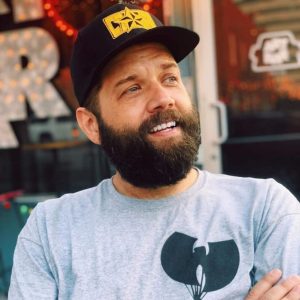
Early on in his recovery, Charles interviewed for many jobs and faced multiple rejections. As his own boss prior to stroke, he was not able to transition into a less demanding role until he was further into his recovery. He eventually secured a job with Door Dash, and throughout his recovery, he continued to try to find a job that would sustain him financially in the long run. The employers Charles interviewed with lacked a relationship with him. Therefore, they did not feel obligated to support or accommodate him during his recovery. They also lacked knowledge about aphasia and were unable—or unwilling—to find ways to support him. On this trying journey, Charles found support in his mother, daughter, and son. Although he did not receive the support he needed from his job, he found emotional support in his family.
Different Experiences Lead to Different Outcomes
Leslie, Shawn, and Charles are all capable of re-entering the workforce. They underwent extensive rehabilitation and went above and beyond in their efforts to recover. Leslie and Shawn were able to return to their original jobs due to the support they received (and their undeterred hard work); their work environment adapted to their needs and their roles were temporarily flexible. On the other hand, as his own boss, Charles lacked support from an employer and struggled to re-integrate into the workforce. Not for a lack of trying and certainly not due to lack of hard work, Charles’ struggle with securing employment may be largely owed to lack of awareness of what aphasia is and, equally importantly, what it is not.
While each story is unique, they echo a common theme: It’s not only about resilience, hard work, and determination. It’s also about lack of awareness and knowledge about aphasia. Individuals living with aphasia may have the ability and qualifications to return to work in a modified capacity; however, employers must be willing to accommodate any communication or physical barriers. In this context, a lack of knowledge may result in missed opportunities to employ highly capable individuals. Increasing awareness of aphasia and its implications for employment is instrumental and the reward is worth the effort: The opportunity to work and the promise of job security offers individuals with aphasia, and their families, a means to an end, a meaningful role in life, and improved quality of life. By extension, it positively enriches our shared community.
Authors:
Kara Willis, Research Volunteer in the USC Aphasia Lab
Sarah Katon, Graduate Research Assistant in the USC Aphasia Lab
Dr. Sigfus Kristinsson, Assistant Professor of Communication Sciences and Disorders, USC
Archive
Aphasia Spotlight
Featured Person with Aphasia - George Collins
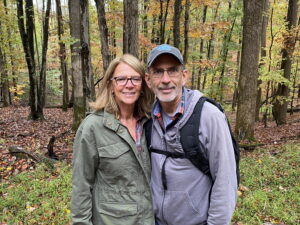
Can you tell us a little bit about yourself?
“I was born and raised in New Hampshire and at age 17 I decided to enter the Army. In the Army, I was both a trained medic and paratrooper. After three years I decided that I wanted to go back to college and become a Physician’s Assistant. Soon after, I met my wife Shellie and married her in 1991. I worked as a PA for ten years in orthopedics and eventually moved to Charlotte, NC where I currently reside. Shellie and I have two sons, Brian and Matthew.”
Can you share with us a brief story about your stroke journey?
“I love to exercise and have always been very healthy. At the time, I was training for my first marathon. Six days before my marathon I started noticing swelling in my left calf. It turned out that I had a DVT blood clot and was later diagnosed with Factor V Leiden. I continued to train for marathons following my diagnosis. In 2018, I decided to take a long bike ride for exercise. Later that day, following my ride, I had my stroke that would also lead to a diagnosis of aphasia. I notice the side effects of my stroke on a regular basis. Although life is different, I am grateful for the chance at recovery and for support I receive from my family and friends at the Aphasia Lab.”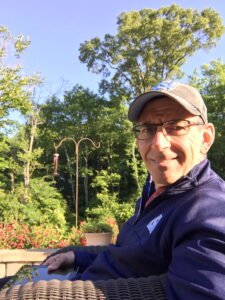
How did you find out about the Aphasia Lab?
“I feel that there is not enough awareness surrounding aphasia. While researching the disorder in search of more information, my wife, Shellie, stumbled upon the Aphasia Lab online.”
How long have you been involved with the Aphasia Lab?
“I have been a part of the Aphasia Lab since September 2019.”
In what ways have you become involved at the Aphasia Lab?
“I have been a part of the POLAR study at the Aphasia Lab, along with several others. I also participate in weekly Zoom group sessions, a weekly reading group, and a monthly luncheon with lab members and other participants.”
What is your favorite part about the Aphasia Lab?
“I enjoy being able to get to know and communicate with other participants at the lab with an aphasia diagnosis. It also provides me with a comfortable environment for practicing my speech, which is extremely beneficial to recovery.”
How has the Aphasia Lab impacted your recovery?
“Having a community of people I can rely on is one of the biggest ways that the Aphasia Lab has impacted my recovery. It is very important to have people who also have aphasia that you can relate to and rely on.”
Have you met people or made friends through the Aphasia Lab?
“I have met many friends through the Aphasia Lab! I particularly enjoy getting to communicate with others, even if it is via Zoom.”
What advice would you give to someone who is just beginning their journey with aphasia?
“Having someone who is there for constant love and support in your life is a crucial part of recovering from and living with aphasia. I have so much gratitude for my wife Shelley. Additionally, finding someone who can act as a mentor within the aphasia community can be beneficial to recovery. It can also make understanding your diagnosis with aphasia easier.”
Is there anything else that you would like to share?
“With aphasia, practice makes perfect! It is very important to use speech regularly regardless of your level of impairment. I cannot stress enough how grateful I am to be in good health following my stroke.”
George is extremely positive and grateful for the opportunity for recovery! His uplifting spirit is truly admirable following his stroke and aphasia diagnosis.
